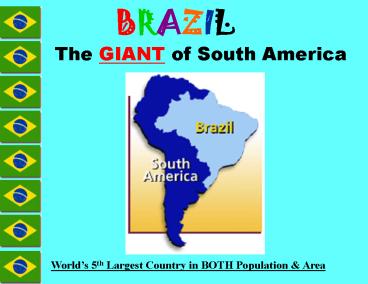BRAZIL - PowerPoint PPT Presentation
1 / 27
Title:
BRAZIL
Description:
Northern Region AMAZONIA ... ARE THE WORLD S MOST ENDANGERED FORESTS IN THE WORLD Ancient History of Spanish-Speaking South America INCA Major ancient ... – PowerPoint PPT presentation
Number of Views:156
Avg rating:3.0/5.0
Title: BRAZIL
1
BRAZIL
- The GIANT of South America
Worlds 5th Largest Country in BOTH Population
Area
2
THE TREATY OF TORDESILLAS (1494) signed by
Spanish Portuguese. - Lands of South America
divided fairly evenly Portugal took lands of
present day BRAZIL Spain took the rest.
Portuguese Objective Gold Silver
Great wealth from Brazil was SUGAR CANE
- Patterns Of Settlement
- Along coasts huge plantations cities
established. - Native labor used/ millions died then
Africans kidnapped sold into slavery in New
World.
3
NORTHEAST REGION
4
A. Northeast Region
- 1. Portuguese first colonized Northeast Brazil
established SUGAR cane plantations - 2. Today
- people in
- northeast
- suffer from
- extreme
- poverty.
5
SOUTHEAST REGION
Includes mega cities of Sao Paulo Rio de
Janeiro (former capital)
6
B. SOUTHEASTREGION
- 17 of the land/ 40 of the population.
- Good Climate Grow diverse crops.
- COFFEE most important crop of region (Worlds
Coffee Pot ---¼ of worlds supply). - Megacities grew on coast the poor with few
skills have limited opportunities/ end up living
in favelas (slums surrounding cities).
7
Rio de Janeiro
and
Sao Paulo
8
F A V E L A S
9
(No Transcript)
10
CENTRAL WEST REGION
Includes the capital city of Brasília and much
of the Brazilian Highlands
11
C. Central Western Region
(includes Brazilian Highlands)
moved from Rio de Janeiro to BRASÍLIA (1960)
- 1. Contains the countrys new
capital - - 2. The government moved capital city 600 miles
inland to develop the countrys interior and draw
the population away from the overcrowded coastal
areas.
12
THE CAPITAL CITY OF BRASILIA
13
D. INDUSTRY
- 1. Brazil developed new industries to
- bring settlement to interior and reduce
crowding poverty in coastal cities. - 2. Industries growing/ many businesses
- people have migrated to interior.
- 3. Govt developed alcohol-based fuel
- GASAHOL (85 ethanol a mixture made from
sugar caneBrazilians grow fuel).
14
HUGE SUPPLIES OF NATURAL RESOURCES MAKE BRAZIL
AN ECONOMIC POWERHOUSE!
CHROMITE
TIN
LAND
IRON
OIL
GOLD
MANGANESE
BAUXITE
QUARTZ
NICKEL
TIMBER
TITANIUM
SILVER
TUNGSTEN
NATURAL GAS
SWIFT RIVERS
15
E. Negative Effects of Development
- 1. Development has improved lives of some
Brazilians, but also has negative effects - a. Cutting down clearing the rain
- forests threatens ecosystems.
- b. Displaces the indigenous
- tribes of the tributaries
- of the Amazon Basin.
16
Northern Region AMAZONIA
17
F. AMAZON RIVER REGION (Basin)
- Largest region in Brazil.
- Contains 50 of land area only 10 of the
population. - Only 200,000
- Indigenous peoples remain in 180 tribal
- groups
18
AMAZON
BASIN
19
(No Transcript)
20
FACTS - 50 of worlds rainforest -
Largest river in world - 20 of world's
river water that runs into oceans -
10 times more water than Mississippi R.
- Fresh water from Amazon flows 200
miles out into Atlantic O. - Amazon
Basin 9 times bigger than Texas. -
Flood Season Amazon rises 30 feet (Dec.
to May)
Amazon Basin 2.5 M square miles Length of
River 6,500 miles
21
- RAIN FOREST
- Cleans earths atmosphere
- Regulates climate
- 3. Shelters millions of species of animal
plant life - Being destroyed for cattle ranches, subsistence
commercial agriculture logging. - THE RAIN FORESTS of BRAZIL ARE THE WORLDS MOST
ENDANGERED FORESTS IN THE WORLD
22
Ancient History of Spanish-SpeakingSouth
America
23
INCA
- Major ancient civilization of the Americas
- Location Andes Mountains
- From Ecuador to Chile by 1500
- Conquered by Spanish in 1500s
- Native spoken language QUECHUA but
- NO written language
24
(No Transcript)
25
Machu Picchu, City of the Inca Kings, Urubamba
Valley of Peru
26
(No Transcript)
27
Inca Artifacts































